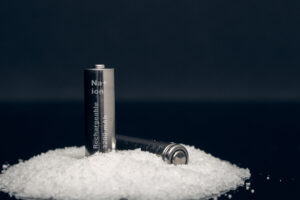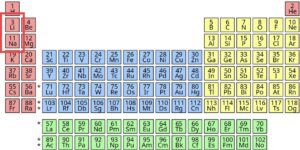Why Your Next Golf Cart Battery Might Be Sodium-Ion

Why Your Next Golf Cart Battery Might Be Sodium-Ion
In recent years, the use of Lithium-ion (Li-ion) batteries in golf carts has seen a significant uptick, largely due to their superior performance over traditional lead-acid batteries. Li-ion batteries have a higher energy density, which means they can store more energy in a smaller, lighter package. This weight reduction can improve the efficiency and maneuverability of the golf cart, as well as reduce wear and tear on your brakes and suspension. Here are a few other benefits of lithium batteries over traditional flooded-lead acid:
- Longer lifespan
- Quicker charging
- Steady power until they are discharged (unlike lead-acid batteries)
- No maintenance
Most Li-ion golf cart batteries currently in use are based on Lithium Iron Phosphate (LiFePO4) chemistry. These batteries have gained popularity due to their safety, long cycle life, and reasonably high energy density.
Does that mean that Li-ion battery technology is the be-all and end-all for electric vehicles? Well, just like anything in life, there are some downsides.
Drawbacks of Li-ion Batteries
While lithium-ion batteries have many advantages over traditional lead-acid batteries, they also come with a set of challenges. One of the key drawbacks is their relatively high upfront cost. Initially, lithium-ion batteries are significantly more expensive than lead-acid batteries, which can be a deterrent for golf cart manufacturers and consumers alike.
Safety concerns, particularly with certain types of lithium-ion batteries such as those using Nickel Manganese Cobalt (NMC) chemistry, are another drawback. While generally safe when properly managed, lithium-ion batteries can pose a fire risk if damaged, overcharged, submerged, or subjected to extreme temperatures.
Does that leave golf cart owners with any alternative for a high-performing, maintenance-free battery solution? Well, there may be another option.
Introducing Sodium-Ion Batteries
This is where Sodium Ion (Na-ion) batteries enter the picture. Interestingly, the energy density of Na-ion batteries isn't drastically different from LiFePO4 batteries. In fact, Lithium and Sodium are neighbors on the periodic table of elements. They are both members of the alkaline group.

This similarity means that battery manufacturers, who already have their production lines configured for Lithium-Ion batteries, can manufacture Sodium-Ion batteries using the same process and even on the same assembly line! All these factors make transitioning from LiFePO4 to Na-ion technology in golf carts a more feasible option than initially thought.
Advantages of Sodium-Ion
With Na-ion batteries, golf cart owners will enjoy many of the previously mentioned benefits of Li-ion batteries. This includes fast charging and no maintenance. However, Na-ion battery chemistry has several advantages over Li-ion.
Cheaper to Manufacture
Na-ion batteries are significantly cheaper to manufacture, with some estimates suggesting savings of up to 30% compared to lithium-ion batteries, which is primarily due to the abundance of sodium - the seventh most common element on Earth, found plentifully in seawater.
Diversified Supply Chain
The world's supply of lithium is predominantly controlled by Chinese companies, and despite the element's widespread presence on Earth, its extraction and refinement process is slow. This makes sodium an appealing option, particularly for Western companies seeking secure battery material supply chains.
Sodium-ion batteries use common and readily available elements like iron, sodium, and titanium, unlike lithium batteries which require lithium, nickel, cobalt, manganese, and graphite. This lack of reliance on scarce and geopolitically sensitive resources like cobalt and rare earth elements, largely controlled by a few nations, makes sodium-ion batteries even more attractive.
Sustainability
Lithium-Ion Batteries present significant recycling challenges due to their diverse sizes, packaging materials, and chemistries. Sodium-ion batteries, while having various chemistries, are generally easier to recycle than lithium-ion. The transition from LIBs to SIBs could offer significant environmental and social benefits, considering the reduced environmental and human rights concerns associated with sodium extraction compared to lithium and cobalt.
More Discharge Cycles
Na-ion batteries boast more discharge cycles than their lithium-ion counterparts, ensuring a longer lifespan. This feature would be particularly beneficial for golf carts, which require frequent charging and discharging.
No Risk of Fire
Furthermore, Na-ion batteries are safer, with virtually no risk of fire, unlike their NMC counterparts. Their stability is due to the inherent properties of sodium, which is less reactive than lithium. This safety advantage would further enhance their appeal for use in golf carts, where safety is paramount.
The Drawbacks of Sodium-Ion Batteries
However, it's not all smooth sailing for Na-ion batteries. The main disadvantage currently is their lower energy density compared to high-performance lithium-ion batteries like the NMC. This lower energy density means that Na-ion batteries must be larger to store the same amount of energy. While this might not be a significant issue for golf carts, it could limit the applicability of Na-ion batteries in more energy-intensive applications, like electric cars.
Drawing a Distinction Between “Passenger Cars” and “Golf Carts”
While the lower energy density of Na-ion batteries is a challenge, it's important to remember that golf carts have different needs compared to energy-intensive electric cars. The lesser range and weight requirements of golf carts make Na-ion technology a viable choice. As the industry moves forward, we expect to see advancements that will further improve the energy density of Na-ion batteries. Additionally, the potential for a lower-priced battery, compared to Li-ion, will certainly be welcomed among golf cart owners.
Final Thoughts
Companies like Faradion are leading the way in Na-ion technology. The British-based company firmly believes in the competitiveness of Na-ion batteries and is actively testing them for Low-Speed Vehicle (LSV) applications. They believe that Sodium Ion battery technology already performs on par with LiFePO4 batteries. It's not hard to imagine a future where Na-ion batteries become the new standard for golf carts, especially with automakers pivoting towards an all-electric future and clamoring to secure enough lithium to produce long-range commercial and passenger vehicles.
When we consider the cost-effectiveness, safety, extended lifespan, and ever-improving battery technology, it's clear golf cart owners should keep an eye on the development of Sodium Ion batteries.
